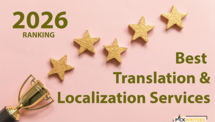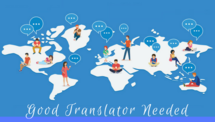Ensuring Accuracy with Handbook Translation Service
7 MIN READ
Prepared by Dina Indelicato, visit her on LinkedIn
Handbook translation services create connections that assist businesses in achieving clarity and compliance through successful communication with multilingual employees. Modern business expansion across international borders and recruitment of multidisciplinary teams require more accurate documentation translation services than ever before. A worldwide employment network requires organizations to provide simple-to-understand language accessibility for all staff members across their policies and procedures.
Good employee handbooks can only be done through professional and high-quality translation services, which can guarantee accuracy, compliance, and cultural adaptation. These specialized providers nevertheless support the combination of legal integrity and cultural relevance as they are linguistic experts who are also deep in knowledge of employment law, HR practices & cultural nuances for their handbook translations.
As we mentioned earlier, this article will discuss why professionals should do handbook translation, the risks of bad translation, and the opportunities businesses would have if they decide to engage the services of HR translation services, manual translation, and the best human translation service for accuracy and compliance.
The Importance of Accurate Handbook Translation
Companies in multilingual environments rely extensively on handbook translation services to guarantee that their employees understand company policies, workplace expectations, and even their legal rights. Employee handbooks are important people references describing the company and its expectations of the workers, such as safety regulations, job responsibilities, benefits, company culture, etc. If these documents are not flown properly to be translated, they can fall prey to common difficulties, such as malcontent among the employees or even a workplace tragedy. In industries such as healthcare, manufacturing, and often, construction, where adherence to safety protocols is important, a clearer or incorrect translation could be fatal.
Proper handbook translations go beyond the legal and safety aspects and offer the additional benefit of a more inclusive and engaged workforce. It is most likely to result in employees who feel valued and confident in their role if they receive policies and procedures in their native language.
It is suitable for communication between management and employees, helps improve productivity, and makes the working environment more cohesive. Complying with regulations and continuing to invest in high-quality translation services is a way to build a strong and informed legal shield around a workforce.
Why Human Translators Are Needed
The best human translation service is usually used by businesses that decide whether to use automated tools. Technology has drawn improvements in translation, but machine-based services are yet to move past legal, industry-specific, and cultural nuances. Automation can be confused or not be complied with if they do not consider the complexity of labor laws, company policies, or even safety procedures. Even such a slight mistranslation in the employee handbook can change the meaning of key policy, and serious legal or operational problems may arise.
HR translation services offered by professionals make use of legal expertise, industry knowledge, and the element of cultural adaptation to avoid any form of inaccuracy. Contracted human translators know what employment laws and workplace slang are so that their policies are linguistically sound to the target audience and pertinent to that audience.
In addition, their capacity to stay consistent in terminology and phrasing within separate sections within a handbook further raises its level of clarity and helps prevent mixing up. This means that businesses can use manual translation instead of using an automated option, thus avoiding placing their employees in lines of risk.
The Role of Handbook Translation in Compliance
One of the most important reasons businesses hire translation services for their handbook is to ensure they conform to labor laws and industry regulations. When companies employ people from different countries, it’s important for them to have workplace policies provided in employees’ native languages, for many countries demand that. If not done so, you will be sued, fined by regulators, or have employee disputes.
Poor translation leads to employees misunderstanding company policies, and the chances that they will unknowingly violate the workplace rules or not follow safety protocols in place are more likely than not to translate into a liability issue for the employer.
A well-translated employee handbook reduces business risks since it a) defines expectations, responsibilities, and legal requirements and b) is well-translated. This makes sure that all employees, even when they cannot understand the language, do not suffer from a lack of information and equal opportunities for assimilation of them.
Specialized professionals familiar with HR translation services help companies comply with their legal obligations while creating conditions such as transparency and fairness in the workplace.
Manual Translation vs. Automated Translation
Human experts manually translate to ensure that text accurately includes its language, legal terminology, and work-specific phrases. There is nothing wrong with using languages — even languages as different as Google Translate and Google Translate would be OK — as such, translated word for word, unless automated tools fail to factor in the context, rendering it misleading or confusing. For example, a machine translation of an employment contract directly may not include legal distinctions that would give rise to potential misunderstanding or dispute.
Quite the difference is a manual translation, which is done carefully, proofread, checked by lawyers, and adapted to cultural norms. Translated handbooks contain the same intent and clarity as the original document; professional translators make sure it stays this way. This increases employee understanding and avoids any misinterpretations, which can result in a business being sued and costing more than it should.
The best human translation service that a company would choose to give to their translation of the handbook will provide them peace of mind, as they know that their policies and procedures will be clearly communicated to their workforce.
How HR Translation Services Improve Workplace Communication
The HR translation services are specialized language solutions for human resources documentation and communication. Lingual expertise and knowledge of work law, place of work regulations, and HR practices lead to translating essential business documents using these services. HR translators are unlike general translation services as they know how to work with the simple terminology that HR requires for workplace communication.
Suitable translated HR materials encourage a transparent, inclusive culture, strengthening employee trust. When workers can obtain reasonable and important information in their first or primary language, they also feel valued by employers. It means more people will engage more because employees will understand their roles, responsibilities, and opportunities within the organization. Also, when communicating accurately translated documents, clear communication is present, which prevents workplace conflicts or compliances.
The scope of HR translation encompasses a wide range of documents. The exact translation is necessary for employment contracts to ensure their legal enforceability and to communicate clearly to the employees about the terms and conditions of work. To maintain consistent bases of working standards, company policies such as codes of conduct and anti-harassment guidelines must be communicated equally.
Making the semantic look-up part of benefit information means that these benefits have been carefully translated so that employees will properly understand and use their healthcare, retirement, and other benefit programs. As such, safety procedures and emergency protocols, particularly meticulous translation, are absolutely necessary to protect worker well-being and regulatory compliance.
The smoothness of the performance management processes is also facilitated by effective HR translation. All employees get equal opportunity to think and participate in their professional growth using translated performance evaluation forms, development plans, and feedback documentation.
The complete focus of this HR translation approach helps check that people are treated fairly. That knowledge is available to everyone regardless of their language, which will help make for a more positive, peaceable workplace.
Key Benefits of Handbook Translation Services
Handbook translation services allow employers as well as employees to make money. By providing for legal compliance, reducing the chances of workplace courts, and helping create a more wholesome company atmosphere, it offers for businesses. The availability of clear, logical, easy-to-understand information regarding employees’ rights, responsibilities, and workplace policies means employees are far more likely to have higher job satisfaction and engagement rates at work.
1. Legal Compliance – Accurate translation will help the business respect local labor laws and industry regulations, and it will minimize the possibility of fines, lawsuits, or any non-compliance issues.
2. Employee Understanding – Well-translated handbooks will be sure that all employees, no matter what the language, are clear as to company policies and rules of the workplace and their rights.
3. Workplace Safety – Safety protocols and procedures translated in clear and precise elaborations will prevent accidents and guarantee observance of health and safety regulations.
4. Inclusivity and Employee Participation– Providing handbooks in employees' native languages makes them feel valued, increasing trust, morale, and overall job satisfaction.
5. HR Workload and Miscommunication – A properly translated handbook does not aid in misunderstandings that lead to HR queries, therefore decreasing the number of inquiries and also increasing productivity in workplace communication.
In addition, accurate translations improve workplace efficiency as this eliminates confusion and consequently calls for repeating to HR from either the employee or the employer. If employees know from the beginning of their tenure at the company what the company policies are, they can blend into the workplace smoothly and without fear. Be it about translating handbooks about basic safety guidelines, employment contracts, or company policies; quality translations improve the organization and legality of the process in the company.
How to Choose the Right Handbook Translation Service
It is equally important to pick a suitable translation provider to achieve accuracy and reliability. Companies should locate professionals who are proficient in HR translation services and comply with labor law. In addition, the policies are also translated and culturally adapted to the workforce by translators who understand industry-specific terminology.
Services with a quality assurance process, such as proofreading, legal verification, and consistency checks, should be given priority to businesses. Avoiding the use of low-cost, machine-generated translations is another equally important practice so that errors in official documents can result in cost problems. By picking a legitimate provider for manual translation, companies guarantee that the employee handbooks they construct meet the highest accuracy, compliance, and clarity standards.
Conclusion
Elucidated handbook translations are necessary so workplaces can remain compliant, work clearly, and keep employees physically and mentally engaged with the job. Handbook translation services, HR translation services, and manual translation help companies save themselves from legal risks and make a well-educated and inclusive workforce.
Rather than relying on automated tools that may introduce errors, businesses should partner with the best human translation service for accuracy, legal compliance, and cultural relevance. By doing so, they protect their organization from legal disputes and foster a positive and well-structured work environment for all employees.














